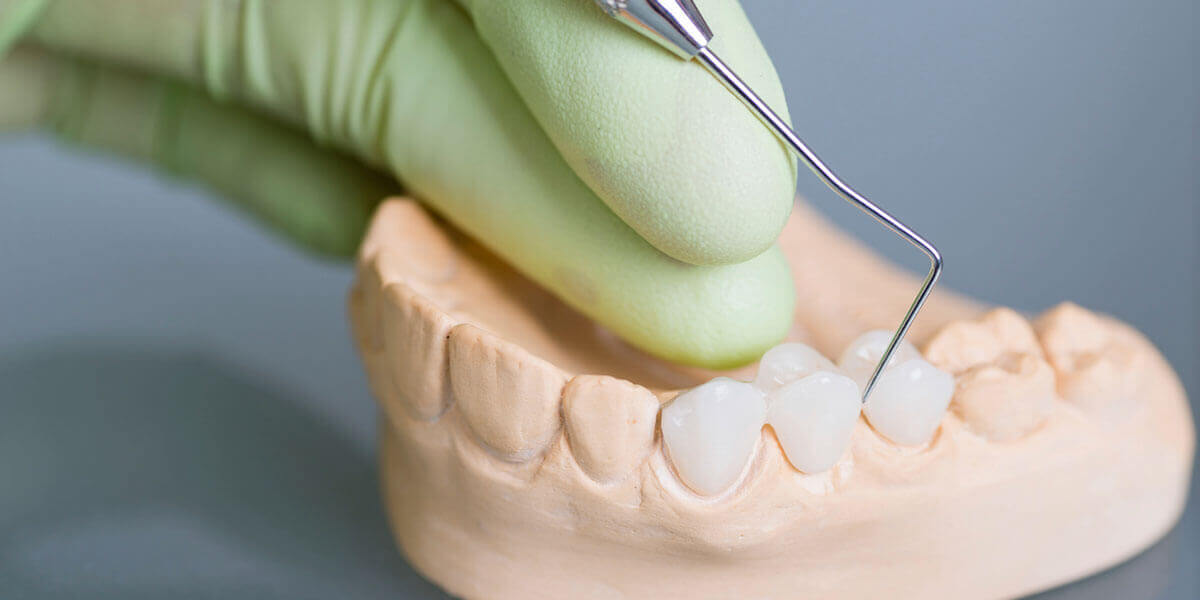Dental Bridges in West Milford, NJ

Agnieszka Jamrozek, DMD, provides dental bridges in West Milford, NJ. Call us at 973-728-3779 or send us an email at ajamrozekdmd@gmail.com to learn more and schedule your appointment.
4 Types of Dental Bridges
According to the American Dental Association (ADA), the average American adult has three missing or badly decayed teeth. Dental bridges are a popular solution for replacing those teeth.
A bridge can replace one or a few missing teeth in a row. It is anchored to either the natural teeth or implants on either end, and consists of replacement teeth known as pontics. There are four basic types of dental bridges:
Traditional Bridge
For a traditional bridge, the natural teeth at either end are prepped and crowned, and the bridge is attached to the crowns. Although this is a solid, durable restoration, it is becoming less popular today due to the need to remove healthy tooth structure from the supporting teeth.
Cantilever Bridge
A cantilever bridge is supported by a healthy tooth on only one end. It can be a useful restoration in some circumstances, but is not usually used on teeth that take a great deal of chewing force. Since there is only one supporting tooth, forces are not distributed, making it more likely for that tooth to fracture or shift.
Maryland Bridge
A Maryland bridge preserves the healthy structure of the supporting teeth, as it uses a metal structure that is cemented onto the backs of the teeth. It is not as strong as a traditional bridge, but can be highly useful in some situations.
Implant Supported Bridge
Today, implant-supported bridges are considered a better option for many restorations. Rather than prepping the existing healthy teeth, your dentist can anchor the bridge on dental implants instead. The result is a strong, stable, long-lasting bridge that does not put your healthy teeth at risk for fracture or decay.
Your dentist will help you decide which type of bridge best meets your needs.
Benefits of Dental Bridges
The most obvious benefit of getting a dental bridge is that it will fill a gap left by missing teeth. But dental bridges have additional benefits such as:
- Many dental bridges do not require surgery (minimally invasive)
- Dental bridges are durable and will last at least as long as a crown (10+ years)
- Bridges offer more stability than dentures
- The artificial tooth will match the shape, size, and color of your other teeth
- Restores speech/improves enunciation
- Improves chewing ability
- Prevents the surrounding teeth from shifting into the gap left by a missing tooth
- Helps maintain normal facial structure
- Improves self-confidence and self-esteem
Am I a Candidate for a Dental Bridge?
Patients in Passaic County who are typically good candidates for a dental bridge include those who:
- Are missing one or more adult teeth
- Are free of active gum disease/infection
- Practice good oral hygiene habits
- Have relatively strong and healthy teeth adjacent to the gap to support the bridge
- Have sufficient jaw bone to support the bridge
- Will commit to maintaining good oral hygiene and regular dental cleanings and exams
Why Should You Choose Dr. Jamrozek for Your Dental Bridge?
Dr. Jamrozek graduated with honors from Rutgers School of Dental Medicine. As an active member of the Passaic County Dental Association, the American Academy of Facials Esthetics, and the American Dental Association, Dr. Jamrozek remains at the forefront of innovations in dental techniques, treatments, and technologies.
Dr. Jamrozek aims to make dental care stress-free and comfortable for all patients. At her modern dental practice in West Milford, NJ, Dr. Jamrozek offers sedation dentistry using nitrous oxide (laughing gas) for patients who are nervous, anxious, or fearful of going to the dentist.
Advanced dental technologies Dr. Jamrozek uses to maximize patient comfort while providing exceptional results include digital x-rays, digital oral cameras, soft and hard tissue lasers, single tooth anesthesia, UV light cavity detection, and more.
Frequently Asked Questions About Dental Bridges
Do dental bridges hurt?
No. Dr. Jamrozek will ensure the area of the mouth to be treated is completely numb. At your request, nitrous oxide can be administered through a painless mask over the nose. Nitrous oxide is a fast-acting, safe sedation option.
Will insurance cover a dental bridge?
Some dental insurance policies offer partial coverage for restorative dentistry treatments, including dental bridges. Because all policies are different, it is best to contact your insurance company for specific coverage limits and exclusions.
Is a dental bridge better than partial dentures?
Most patients prefer the stability and security of a dental bridge. Dental bridges don’t require adhesives, which many patients appreciate.
How long will a dental bridge last?
Dental bridges typically last between 10-15 years, though some may need to be replaced sooner. Other patients may find that their dental bridge lasts longer than 15 years.
To learn more about replacing missing teeth with a dental bridge in West Milford, NJ, call us at 973-728-3779 , or email us at ajamrozekdmd@gmail.com to request an appointment.